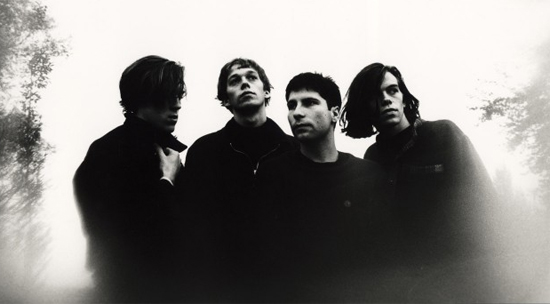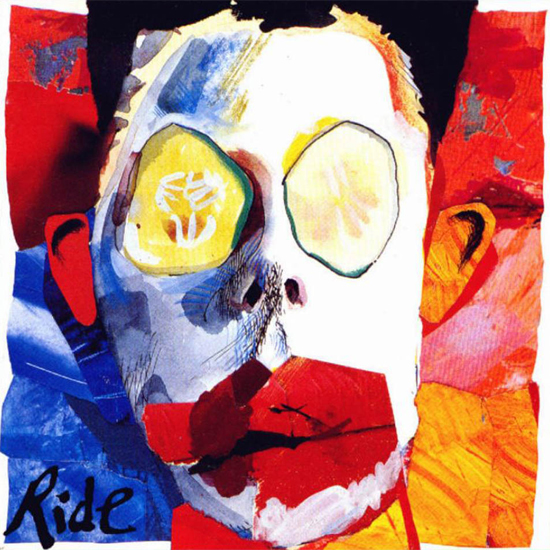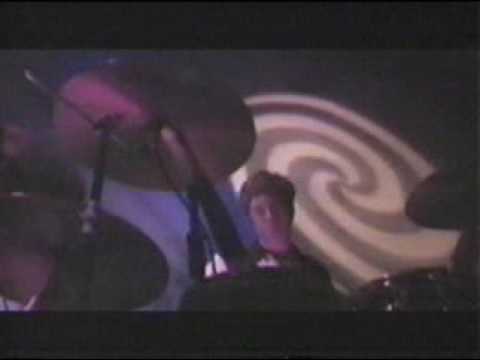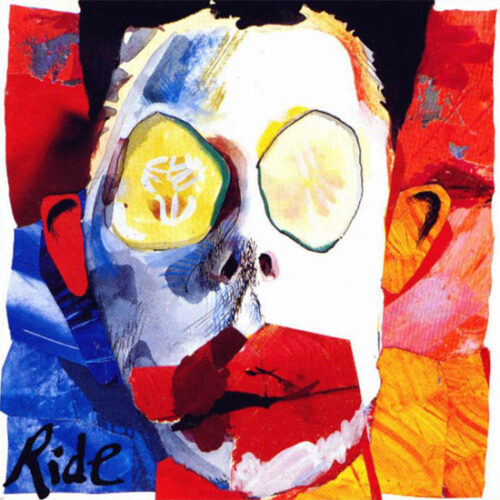This article was originally published in 2012 to mark the album’s 20th anniversary
"People were so in love with how we did things at the start, but the thing is that we’d changed quite a lot as people during that process. I think Going Blank Again reflected that. I think for a lot of people it was a bit of a shock. Maybe they expected another darker, Nowhere-style record." Mark Gardener, April 2012
"It was ahead of its time for people who wanted grunge and shoegaze. Either it didn’t associate itself clearly with a particular movement in music at the time, or there just wasn’t a movement in music at the time, which is perhaps the truth. It happened on its own." Loz Colbert, April 2012
The four members of Ride, Andy Bell (guitar/vocals), Mark Gardener (guitar/vocals), Loz Colbert (drums) and Steve Queralt (bass), entered the residential Chipping Norton studios, just outside Oxford, in October 1991 to record the follow-up to their critically-acclaimed debut album Nowhere, a week or so after Nevermind by Nirvana was released. That record would change everything and shift the focus of the nation and the music press to the US, rendering Going Blank Again, the album Ride would make with the producer Alan Moulder in a crazily productive six-week period, if not irrelevant, then suddenly out of step.
The previous couple of years couldn’t have gone any better for Ride. Their self-titled debut EP slipped into the Top 75 (something of a coup at that time) in 1990 and they didn’t look back from there, appearing on Top of the Pops and the cover of all the inkies (and even pop bible Smash Hits) in the ensuing 18 months, redefining what could be achieved as an "indie" band in the process. Ride proved that you could be signed to a non-major label like Creation and still have Top 20 singles and albums, without having to compromise on anything. Of course it helped that none of Ride were acquainted with the ugly stick, and in Mark Gardener they had a bonafide heartthrob centre stage; a "choirboy on acid", floppy of fringe and with bee-stung lips by way of Beatrice Dalle. All were still only in their early-20s.
Despite a frenzy of expectation from the outside, the band, interviewed in April 2012 for the liner notes of the 20th anniversary reissue of Going Blank Again, recall the general mood in Chipping Norton as relaxed. After such a meteoric rise, the band felt a healthy pressure to come up with something better. Supported by Alan McGee and Dick Green at Creation they were free to digest their influences, experiment, follow their instincts, and make the sort of the record that they wanted to make.
"When we started out we were an amalgamation of three bands – the Jesus and Mary Chain, My Bloody Valentine and the House of Love," Andy told Vox magazine in March 1992. "Now we’re influenced by a whole mixture of stuff."
That "stuff" included Massive Attack’s Blue Lines, Nick Drake, Holland and Surf’s Up by the Beach Boys, the Small Faces, mid-period Who, mid-period Kinks, Neil Young, Brian Eno, Tim Buckley, Kraftwerk, Neu!, the Specials, the Faces, Rod Stewart, Scientist, Humble Pie, Led Zeppelin, Television, Disintegration by the Cure, Big Star, Beastie Boys, New Order and hip-hop; and away from music, the novels of Norman Mailer, Milan Kundera’s The Unbearable Lightness of Being, and the films Withnail and I (before it became a student staple) and Billy Liar.
‘Leave Them All Behind’ was the first single to be released from Going Blank Again; a statement of intent as much as a song. Alan McGee went absolutely nuts when he first heard it, leaping out of his seat and jumping around like a demented gibbon. He was determined that, despite clocking in at 8m 17s, it would be a single. Opening with a Hammond organ riff lifted from ‘Won’t Get Fooled Again’ by The Who, it was an epic avalanche of polished noise; the sound of a band turning on the afterburners and effortlessly zooming away from their contemporaries. "This is a statement for the future," said Melody Maker. It entered the charts at No 9.
"Going Blank Again was our pop record," says Mark. ‘Leave Them All Behind’ was followed by ‘Twisterella’, a three-minute guitar-pop sparkler with a mesmerising hook. It was a conscious effort to move away from the quiet/loud shoegaze dynamic. The album was crammed full of the kind of crisp, clean, melodic riffs (‘Not Fazed’; ‘Mouse Trap’; ‘Time of Her Time’) that would later be adopted by Britpop’s protagonists, with Mark and Andy’s vocals to the fore instead of buried beneath swathes of distortion. The string-drenched ‘Chrome Waves’ was "an obvious rip-off of Massive Attack’s ‘Unfinished Sympathy’", admits Steve. ‘Cool Your Boots’ was purposely constructed to have a long, juicy outro that showcased the immense improvisational drumming skills of Loz. The "finale… has Loz kicking his drum kit all over your carpet," said David Cavanagh of Select magazine. Even the rather twee and "sickeningly lightweight" (Andy) ‘Making Judy Smile’ had its Kinks-referencing charm. "I can’t imagine Bauhaus getting away with it," said Loz, cheekily, to Melody Maker. Mark’s sci-fi oddity ‘Time Machine’ started out sounding like Simon and Garfunkel before Steve added his bolshy, Peter Hook-aping bassline. To close ‘OX4’ (about scoring dope in Oxford), with its krautrocking rhythms and surging, euphoric coda, had more in common with Neu! than the Valentines.
The original intention for Going Blank Again was for it to be a double album. The studio time was incredibly fertile, with around 26 songs on the go at once. "We wanted it to be a double album, like The White Album, plus we wanted to do a long suite of songs like on Abbey Road," says Andy.
McGee, ever willing to indulge his charges, had no problem with this. But when Ride’s US label Sire/Warner Brothers (they had been snapped up by Seymour Stein, the man who signed Madonna) got wind of what the band were proposing, they suggested they should reconsider. ‘Do you want to release a double album, or do you want to edit it? And how about taking these tracks off?’ "I can’t remember if that was a hollow threat, or just a friendly suggestion but it certainly worked," says Steve. "It made us come to our senses."
"Though the suggestion came from the States, we all signed off on it," admits Andy. "The thinking was, ‘Well instead of a double album let’s make it a killer single album’."
The pulled songs included two from Loz – ‘Blue’ and ‘Everybody Knows’ – his first compositions for the band. "It’s fair to say that I was absolutely devastated," he reveals. "I’d only just had the guts to have a go and I was riding that surge of energy that comes from being around great writers like Mark and Andy."

There are ghostly echoes of the axed songs throughout the album. A truncated version of Steve’s dub workout ‘King Bullshit’ prefaces ‘Time Machine’, as does an ephemeral hint of Loz’s wispily ambient ‘Blue’. The squalling feedback carnage of ‘Motorway Madness’ ("Basically the ‘Drive Blind’ noise section going on for ever": Andy), originally intended as an album closer, appears in the intro to ‘OX4’.
The biggest loss was Andy’s ‘Tongue Tied’, but that didn’t make the cut for a different reason. "It was too personal for me," he explains. "It was about the break-up with my girlfriend from before I met my first wife, and it was basically an admission that I’d caused a lot of hurt. I didn’t feel comfortable putting it out."
‘Tongue Tied’ is one of the best things Ride committed to tape. Steve concurs: "It is one of the few occasions where the intensity and beauty of Ride was captured on tape. Everything fits together perfectly." From the opening crisp acoustic strumming to another example of Loz’s peerless drumming (why just whack out a beat when you can cascade endlessly brilliant fills and rolls?), a classic Andy lyric and vocal, chiming Byrdsian guitars and flashes of distorted riffs. Loz even busts out the tablas. That would never have happened on Nowhere. It is Ride at the peak of their powers.
Releasing a double album with a suite of instrumental wig-outs for your second offering was probably a grand folly, and a self-indulgent disaster averted. "The version we released was quite tame to what we actually recorded," Andy concludes. "It was way less broad than what we intended." But 20 years on, Going Blank Again is still one of the great lost records of the 90s; standing alone with no scene to ally itself to, buried beneath the grunge avalanche. "It was the rumblings of Britpop before the earthquake, really," says Loz, sagely. Had it been released two years later, things could have been very different. Instead, in 1994 Ride released the retro-Byrds/Faces stylings of Carnival of Light, again a couple of years in advance of that approach coming back into fashion.
Going Blank Again did garner favourable reviews and decent sales (it was a Top Five album in the UK, and 2000 fans attended a signing session at Tower Records in Piccadilly – a figure beaten only by Bon Jovi). "[It’s] a monster leap from Nowhere… an absolute pop trip. Let’s talk classic albums in about two years," said David Cavanagh in Select. But it didn’t quite work out like that. The second single, ‘Twisterella’, released in April 1992, only just crept into the Top 40, not getting anywhere near the amount of radio and TV support anticipated, leading Creation to decide not to release any more singles from the album. The album campaign was over in the UK and the band headed off on a troubled tour of the States, where rifts would open that would never be healed.
When the legacy of Ride is considered, it is always Nowhere that gets the nod – Pitchfork listed their debut as one of the greatest records of the 1990s. But Going Blank Again deserves to be as fondly recalled as the band’s debut. It’s a far more vibrant and outgoing record than its monochrome predecessor. It is brave, diverse and assured. Endless touring had made them into confident, accomplished musicians, writing far more complex songs. And while it may have struggled to make sense in the UK landscape, it fared better globally. Overall it has sold more copies than Nowhere, as it was a genuine hit in France, Sweden, America, Japan and Australia – territories where Ride still enjoy a huge following and where there is an increasing clamour for the band to reform.
"We always believed we were miles better than all the other bands," says Andy. "At the time we were like The Who. We were a wild fucking rock band live. But people always talk about My Bloody Valentine, they always mention Loveless. There’s a shorthand to music, and when people say name your favourite bands, I’ll go ‘The Beatles and The Stones.’ But I don’t listen to The Beatles and The Stones as much as The Kinks and early-Pink Floyd. But somehow certain bands slip easily off the tongue. I don’t think Ride are one of those bands, but it doesn’t mean to say that people don’t listen to us. I think they do."
Going Blank Again: 20th Anniversary Edition is released on August 6th, available to buy from here. The remastered, expanded edition includes a bonus DVD of the Brixton Academy show from 27/03/92.




